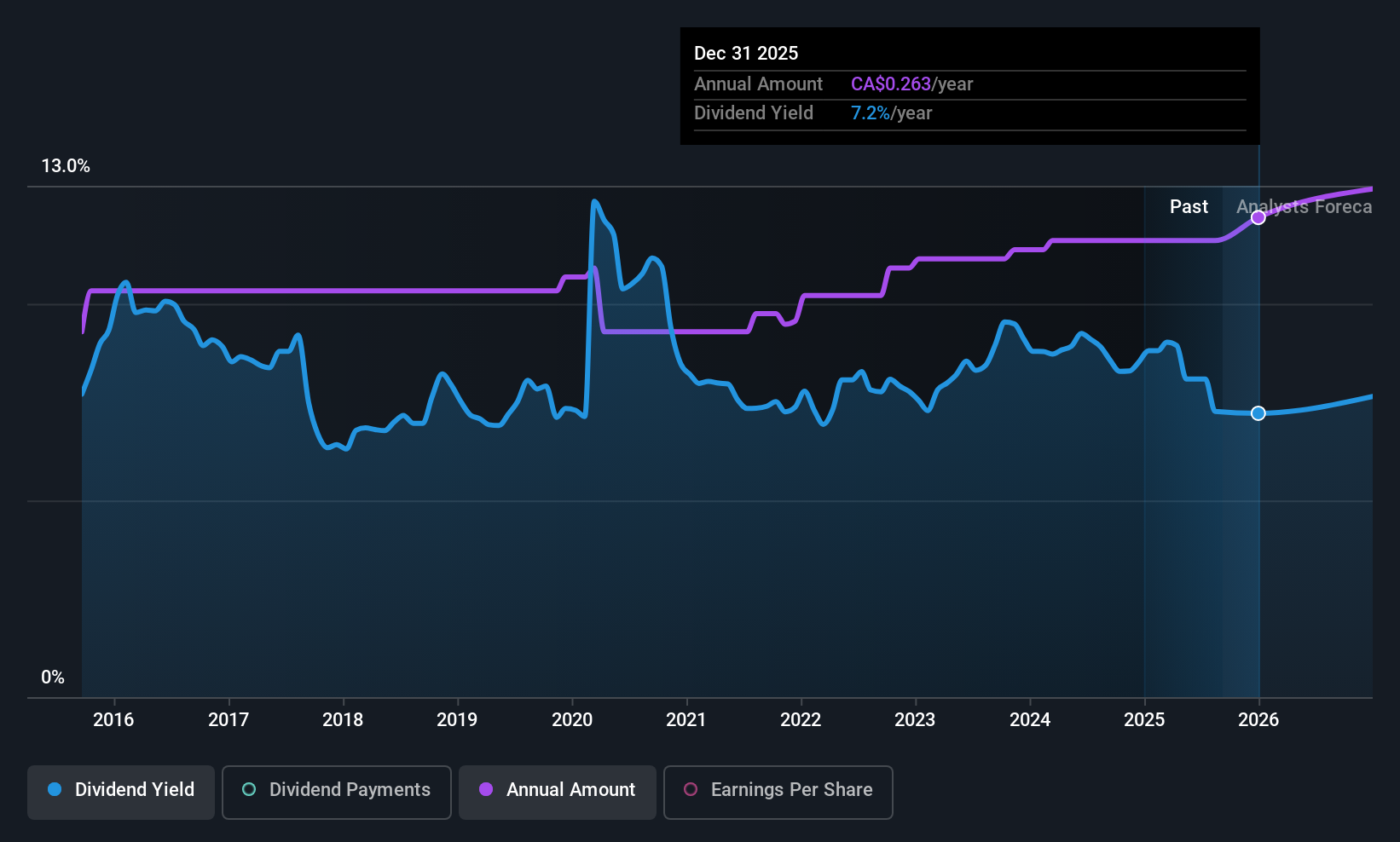Diversified Royalty Corp. (TSE:DIV) will pay a dividend of CA$0.0229 on the 29th of September. The dividend yield will be 6.9% based on this payment which is still above the industry average.
Diversified Royalty's Projections Indicate Future Payments May Be Unsustainable
We like to see robust dividend yields, but that doesn't matter if the payment isn't sustainable. Based on the last payment, earnings were actually smaller than the dividend, and the company was actually spending more cash than it was making. Paying out such a large dividend compared to earnings while also not generating free cash flows is a major warning sign for the sustainability of the dividend as these levels are certainly a bit high.
The next 12 months is set to see EPS grow by 15.8%. If the dividend continues on its recent course, the payout ratio in 12 months could be 139%, which is a bit high and could start applying pressure to the balance sheet.

Check out our latest analysis for Diversified Royalty
Diversified Royalty Has A Solid Track Record
The company has an extended history of paying stable dividends. The annual payment during the last 10 years was CA$0.188 in 2015, and the most recent fiscal year payment was CA$0.25. This implies that the company grew its distributions at a yearly rate of about 2.9% over that duration. Slow and steady dividend growth might not sound that exciting, but dividends have been stable for ten years, which we think makes this a fairly attractive offer.
Dividend Growth Could Be Constrained
The company's investors will be pleased to have been receiving dividend income for some time. We are encouraged to see that Diversified Royalty has grown earnings per share at 26% per year over the past five years. Although earnings per share is up nicely Diversified Royalty is paying out 149% of its earnings as dividends, which we feel is borderline unsustainable without extenuating circumstances.
The Dividend Could Prove To Be Unreliable
In summary, while it's good to see that the dividend hasn't been cut, we are a bit cautious about Diversified Royalty's payments, as there could be some issues with sustaining them into the future. We can't deny that the payments have been very stable, but we are a little bit worried about the very high payout ratio. We would probably look elsewhere for an income investment.
Companies possessing a stable dividend policy will likely enjoy greater investor interest than those suffering from a more inconsistent approach. Still, investors need to consider a host of other factors, apart from dividend payments, when analysing a company. Just as an example, we've come across 3 warning signs for Diversified Royalty you should be aware of, and 2 of them are a bit unpleasant. Looking for more high-yielding dividend ideas? Try our collection of strong dividend payers.
New: Manage All Your Stock Portfolios in One Place
We've created the ultimate portfolio companion for stock investors, and it's free.
• Connect an unlimited number of Portfolios and see your total in one currency
• Be alerted to new Warning Signs or Risks via email or mobile
• Track the Fair Value of your stocks
Have feedback on this article? Concerned about the content? Get in touch with us directly. Alternatively, email editorial-team (at) simplywallst.com.
This article by Simply Wall St is general in nature. We provide commentary based on historical data and analyst forecasts only using an unbiased methodology and our articles are not intended to be financial advice. It does not constitute a recommendation to buy or sell any stock, and does not take account of your objectives, or your financial situation. We aim to bring you long-term focused analysis driven by fundamental data. Note that our analysis may not factor in the latest price-sensitive company announcements or qualitative material. Simply Wall St has no position in any stocks mentioned.
About TSX:DIV
Diversified Royalty
A multi-royalty corporation, engages in the acquisition of royalties from multi-location businesses and franchisors in North America.
Good value average dividend payer.
Market Insights
Community Narratives



